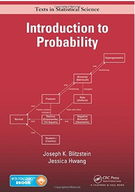As explained in this chapter, Simpsons paradox says that it is possible to have events
Chapter 2, Problem 52(choose chapter or problem)
As explained in this chapter, Simpsons paradox says that it is possible to have events A, B, C such that P(A|B,C) < P(A|Bc, C) and P(A|B,Cc) < P(A|Bc, Cc), yet P(A|B) > P(A|Bc). (a) Can Simpsons paradox occur if A and B are independent? If so, give a concrete example (with both numbers and an interpretation); if not, prove that it is impossible. (b) Can Simpsons paradox occur if A and C are independent? If so, give a concrete example (with both numbers and an interpretation); if not, prove that it is impossible. (c) Can Simpsons paradox occur if B and C are independent? If so, give a concrete example (with both numbers and an interpretation); if not, prove that it is impossible.
Unfortunately, we don't have that question answered yet. But you can get it answered in just 5 hours by Logging in or Becoming a subscriber.
Becoming a subscriber
Or look for another answer
